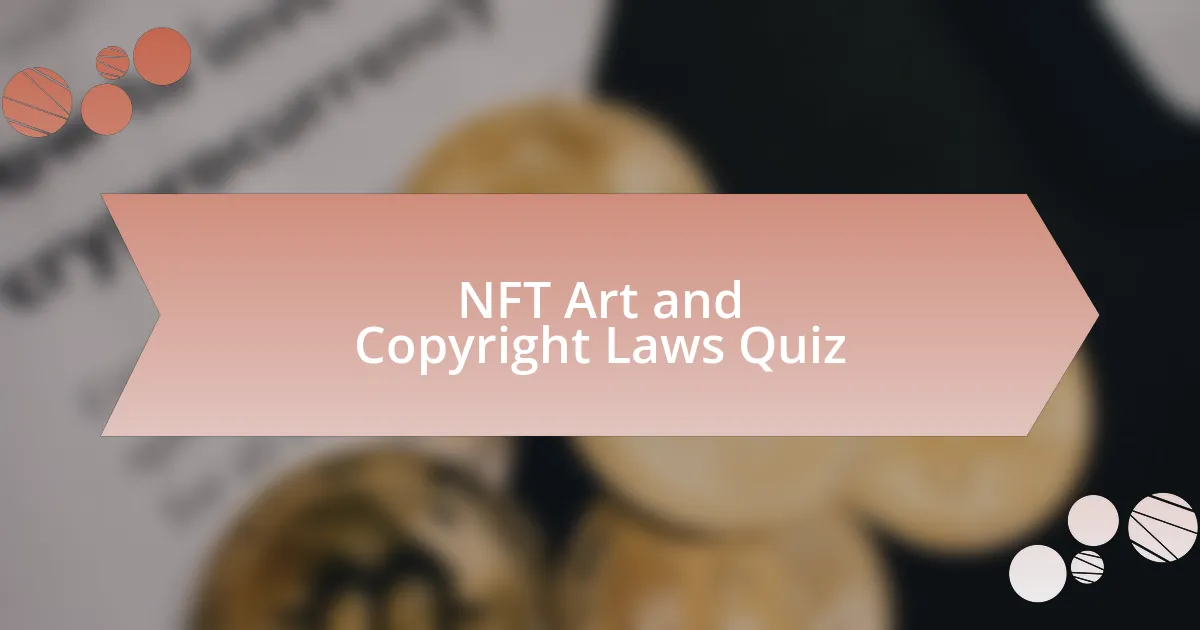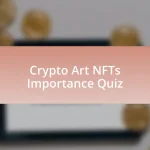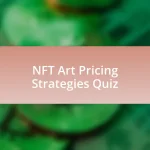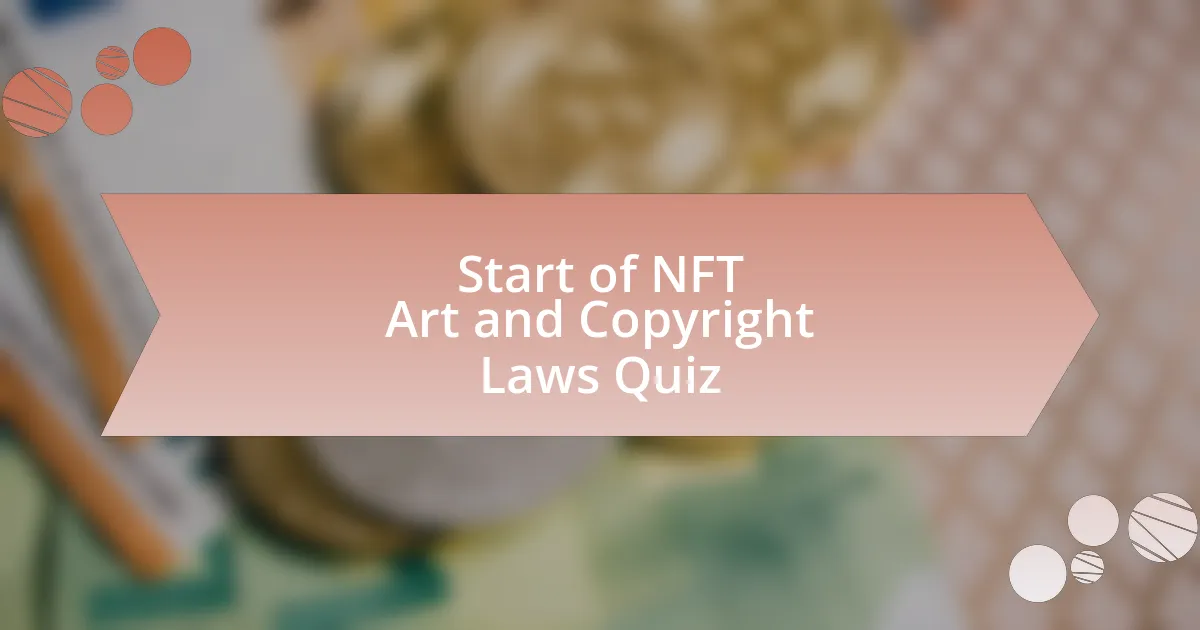
Start of NFT Art and Copyright Laws Quiz
1. What is the default rule regarding copyright transfer to NFT purchasers?
- NFT purchasers own all rights to the artwork, including copyright, without limitation.
- Copyright must be paid for separately from the NFT purchase price.
- The copyright transfers automatically to the purchaser upon buying the NFT.
- The copyright to creative works does not transfer to the purchaser of the works unless the NFT creator actively transfers or licenses the rights.
2. Can an NFT purchaser make copies of the original work without permission?
- No, but they can make copies if used for personal purposes.
- Yes, all NFT purchasers can copy it freely.
- Yes, they have full rights to alter the original work.
- No, unless the NFT creator has separately transferred or licensed the copyright rights to the purchaser.
3. What is the purpose of a license in the context of NFTs?
- A license grants specific rights to the NFT purchaser, such as the right to display, copy, or create derivative works.
- A license transfers full ownership rights of the NFT and all associated copyrights.
- A license nullifies previous copyright laws and regulations for the NFT.
- A license restricts all uses of the NFT, preventing display, copying, or derivatives.
4. How are copyright transfers typically documented?
- Copyright transfers must be in writing, not orally or by implication from conduct.
- Copyright transfers need to be notarized by a legal professional.
- Copyright transfers can be verbal agreements made between parties.
- Copyright transfers are automatically granted with the sale of any artwork.
5. Can an NFT creator exclude certain rights from being transferred to the purchaser?
- No, all rights automatically transfer to the purchaser without exception.
- Yes, the creator can exclude rights such as the right to create derivative works or commercially exploit the artwork.
- Yes, the creator must include all rights when selling an NFT.
- No, the purchaser can decide which rights to keep or transfer.
6. What are the implications of using an NFT artwork as a profile picture on social media?
- Using an NFT artwork as a profile picture enhances the value of the artwork for everyone.
- Using an NFT artwork as a profile picture automatically grants the user copyright rights.
- Using an NFT artwork as a profile picture without permission from the copyright holder constitutes a violation of copyright law.
- Using an NFT artwork as a profile picture is always legal and doesn’t require permission.
7. How does the ownership of an NFT affect the ability to stop others from making copies of the artwork?
- Owning an NFT grants full copyright, preventing any copies.
- The ownership of an NFT does not prevent others from making copies of the artwork if the copyright holder has not transferred or licensed the rights.
- An NFT grants exclusive rights to replicate and sell the artwork.
- NFT ownership allows the creator to enforce copyright on all copies made.
8. Can an NFT creator share all of the rights to the artwork linked to the NFT?
- No, a creator cannot share any rights to the artwork linked to the NFT.
- Yes, but only if the artwork is original and not copied.
- Yes, but this should be done carefully and with consideration of the creator`s future plans and needs.
- No, ownership of the NFT automatically includes all rights to the artwork.
9. What rights might be included in a license agreement for an NFT?
- The rights might include the right to exclusively sell the NFT and ban all sharing of the artwork.
- The rights might include the right to destroy the original artwork and make unlimited reproductions.
- The rights might include the right to alter the blockchain ledger and modify the NFT`s metadata.
- The rights might include the right to display, copy for specific incidental purposes, create derivative works, and commercially exploit the artwork.
10. How does the use of Creative Commons licenses apply to NFTs?
- Creative Commons licenses can be used to share, give away, or give up all of the rights to the artwork linked to the NFT.
- Creative Commons licenses restrict the ability to display the NFT publicly.
- Creative Commons licenses prevent any modifications to the NFT artwork.
- Creative Commons licenses automatically transfer copyright to the NFT buyer.
11. Does the sales platform need to specify who owns the copyright in the smart contract?
- No, the sales platform does not need to specify ownership of copyright.
- Yes, ownership is implied and does not need to be stated.
- Yes, the sales platform should specify who owns the copyright in the smart contract.
- No, copyright ownership is automatically transferred with the NFT.
12. Who needs permission to display an NFT image for public viewing?
- The platform typically needs the permission of the copyright holder in the underlying work.
- Only social media platforms require consent for displaying NFTs.
- The owner of the NFT must grant permission for public display.
- Anyone can display an NFT image without restrictions.
13. How do future resale royalties work in NFT sales?
- NFTs that provide for future resale royalties automatically pay out these royalties to the creators when the NFT is sold. This is handled by the blockchain.
- Resale royalties are not possible in NFT sales; only the initial sale generates income for the creator.
- Future resale royalties depend on external contracts and cannot be coded into the NFT itself.
- Future royalties are only paid after explicit permission is granted by the buyer for each sale.
14. What commercial laws apply to the sale of an NFT?
- The Uniform Commercial Code (UCC) Article 2 governs digital art sales.
- The Copyright Act governs intangible assets exclusively.
- The Digital Millennium Copyright Act applies to NFT transactions.
- Only international trade laws govern the sale of NFTs.
15. Can a sales platform’s terms and conditions protect it from involvement in disputes over the NFT?
- No, the platform has no role in resolving any disputes whatsoever.
- No, terms and conditions are irrelevant for NFT disputes.
- Yes, but only if the NFT is physically displayed by the platform.
- Yes, but the terms and conditions should be drafted with extraordinary specificity and reasonableness to avoid unfair or harsh results.
16. What happens if there is a dispute over the NFT?
- Disputes are settled through public voting.
- All rights are returned to the original creator immediately.
- The sales platform automatically resolves disputes.
- The current owner can pursue the artist for remedies.
17. Are NFTs protected by copyright?
- All NFTs automatically come with copyright ownership.
- Copyright protection applies only to the metadata of NFTs.
- NFTs are fully protected by copyright as original creations.
- NFTs themselves are not protected by copyright, but the artwork linked to them may be.
18. What should an artist consider before minting NFTs?
- The price each NFT will be sold for.
- The rights being granted and their alignment with the project summary.
- The color palette to be used in the artwork.
- The total number of NFTs planned for minting.
19. How does the blockchain nature of NFTs affect the enforcement of terms or prosecution of breaches?
- The blockchain can automatically handle notifications and payments for resale royalties and other terms, but it does not inherently enforce terms or prosecute breaches.
- The blockchain guarantees automatic legal action against anyone who violates the terms of an NFT sale.
- The blockchain provides complete immunity from copyright disputes and other legal challenges regarding NFTs.
- The blockchain enforces all contractual agreements without exceptions and monitors all transactions continuously.
20. Are there any specific laws or regulations that apply to NFTs?
- No, NFTs are not subject to any regulations.
- Yes, NFTs are regulated like traditional stocks and bonds.
- Yes, there are uncertainties about what substantive law will govern the sale of NFTs.
- No, NFTs are completely free from legal scrutiny.
21. Can NFT creators maintain moral rights over their artworks after selling them?
- No, moral rights are only for physical artworks.
- No, NFT creators lose all rights once sold.
- Yes, NFT creators can retain moral rights to their artworks after selling them.
- Yes, but only if they keep ownership of the NFT.
22. What happens if an NFT is sold without proper copyright clearance?
- The NFT cannot be sold again under any circumstances.
- The original creator can pursue legal action for copyright infringement.
- The NFT will become worthless overnight.
- The purchaser automatically gains full rights to the artwork.
23. How do copyright laws differ for traditional art and NFT art?
- NFT purchasers have full commercial rights upon purchase, including the ability to resell the artwork.
- The copyright automatically transfers to the purchaser upon buying the NFT.
- The copyright to creative works does not transfer to the purchaser of the works unless the NFT creator actively transfers or licenses the rights.
- NFT creators lose all rights to the artwork once the NFT is sold.
24. What role does provenance play in the value of NFT art?
- Provenance has no effect on the value of NFT art.
- Provenance is used to create physical copies of the NFT art.
- Provenance determines the price solely based on the artist`s popularity.
- Provenance verifies the authenticity and ownership history of the NFT art.
25. Can an NFT be created for an already existing copyrighted work?
- No, only original works can have NFTs.
- No, NFTs can only be associated with tangible items.
- Yes, but only with permission from the publisher.
- Yes, an NFT can be created for an existing copyrighted work.
26. How do licensing agreements for NFTs impact the resale value of digital art?
- Licensing agreements prevent any resale of the digital art.
- Licensing agreements always decrease the resale value of digital art.
- Licensing agreements have no effect on resale values at all.
- Licensing agreements can enhance resale value through assigned rights.
27. What risks do artists face when selling their work as an NFT?
- Immediate increase in selling price.
- Loss of copyright and control over usage.
- High visibility and free promotion.
- Guaranteed passive income from sales.
28. How can NFT platforms address copyright infringement issues?
- Implement clear licensing agreements for NFT creators.
- Ban all use of NFTs on any platform.
- Automatically transfer copyright without agreements.
- Allow buyers to copy the original artworks freely.
29. What are the potential legal challenges faced by NFT marketplaces?
- Copyright laws and potential copyright infringement claims
- Patent rights and intellectual property ownership
- Real estate laws and property transfer issues
- Tax regulations and sales tax compliance
30. How can artists protect themselves when entering the NFT space?
- Artists cannot include conditions in the NFT sales.
- Artists have no control over their artworks once sold as NFTs.
- Artists must transfer all rights to the NFT buyer.
- Artists can specify their rights in the NFT contract.
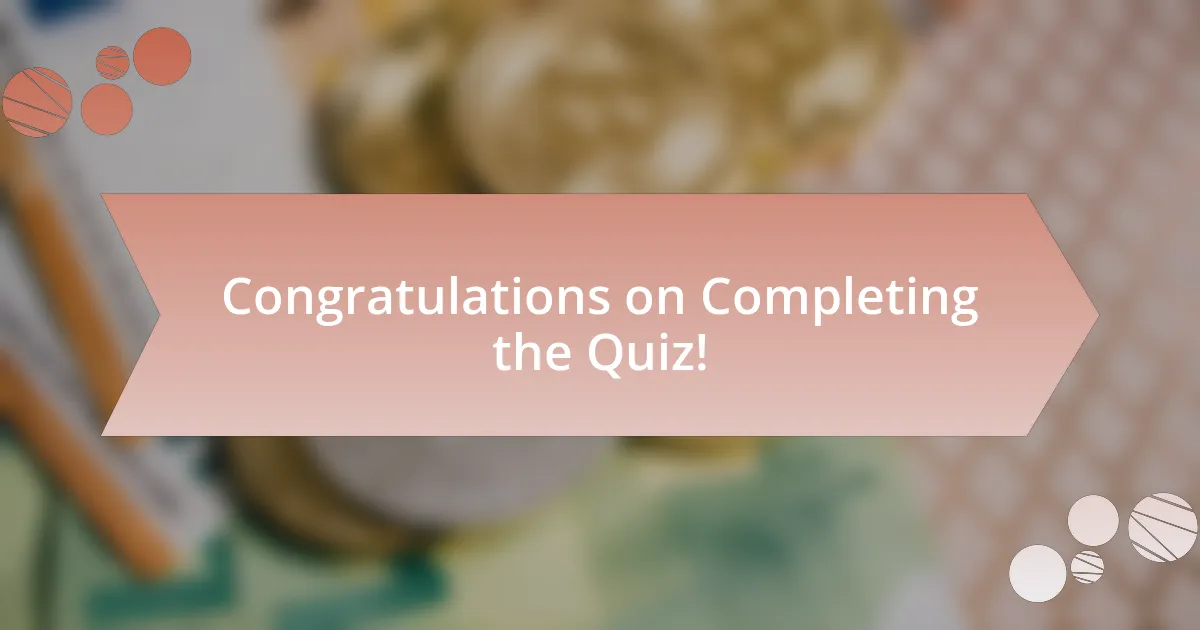
Congratulations on Completing the Quiz!
Thank you for participating in our quiz on NFT Art and Copyright Laws! We hope you found the experience enjoyable and informative. Engaging with this topic can deepen your understanding of the complex intersection between digital art, technology, and legal frameworks. It’s important to grasp how copyright laws apply to NFT art, especially in today’s rapidly evolving digital landscape.
Throughout the quiz, you may have learned about the importance of copyright in protecting creators’ rights. Understanding concepts like ownership, royalties, and the legal implications of NFTs can empower artists and collectors alike. This knowledge is crucial for navigating the NFT marketplace responsibly and ethically.
If you’re eager to expand your knowledge further, we invite you to check our next section. It will provide more in-depth information on NFT Art and Copyright Laws. Explore how these laws affect artists and buyers and gain insights that can enhance your comprehension of this fascinating field. Happy learning!
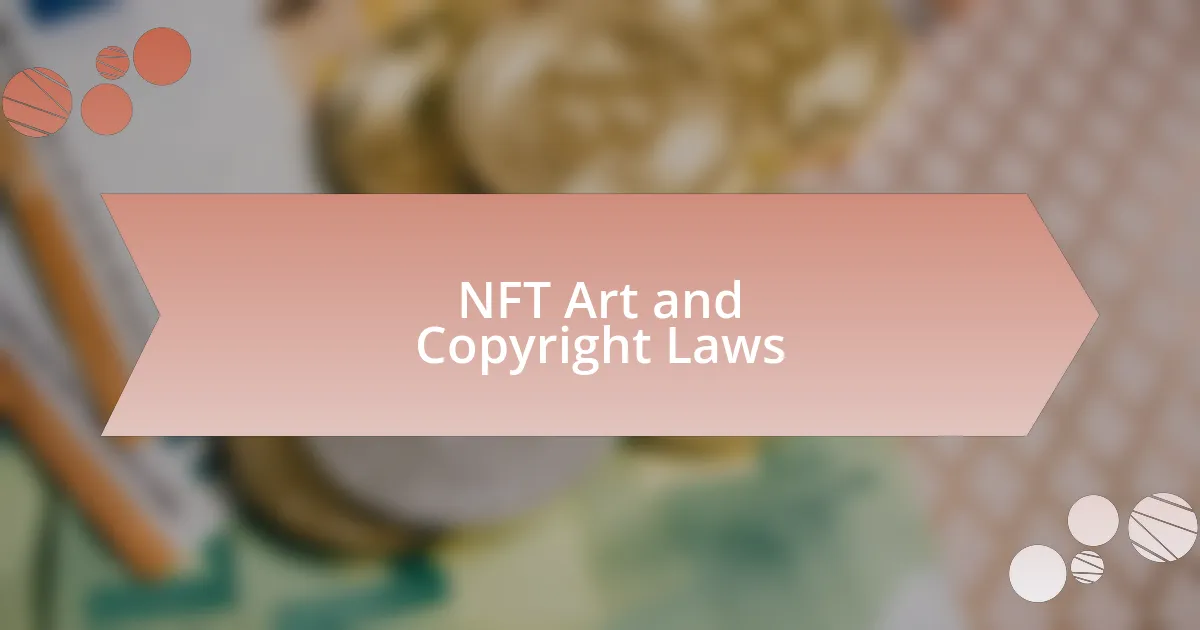
NFT Art and Copyright Laws
Understanding NFT Art
NFT art refers to digital art pieces that are minted as non-fungible tokens on a blockchain. These tokens verify ownership and authenticity of the artwork. Unlike traditional art, digital files can be easily replicated, leading to questions about originality and scarcity. Ownership is recorded on a decentralized ledger, allowing creators to sell their work directly to collectors. This innovation has changed the landscape of the art market.
Copyright Basics in Art
Copyright grants creators exclusive rights to use and distribute their original works. It protects both published and unpublished art, including any form of creative expression. Copyright does not cover ideas or concepts, but rather the specific expressions of those ideas. These rights support the financial interests of artists by preventing unauthorized reproduction of their work. In practice, it helps ensure creators receive credit and compensation for their artistic endeavors.
Copyright Implications for NFT Art
NFT art still falls under copyright protection. When an artist creates an NFT, they typically retain copyright unless explicitly transferred. Buyers of NFTs acquire the token and associated ownership of the digital representation. However, they do not automatically gain copyright. The distinction between ownership of the token and copyright can lead to confusion in the marketplace and legal complexities.
Legal Challenges in NFT Ownership
The NFT market presents unique legal challenges, particularly regarding copyright infringement. Issues arise when artists discover their work is tokenized without consent. This unauthorized minting can lead to disputes over ownership and financial remuneration. Additionally, many jurisdictions have not yet established clear legal frameworks for NFTs, causing ambiguity in enforcement of copyright laws related to digital assets.
Future of Copyright Laws and NFT Art
The evolution of NFT art is prompting regulatory bodies to reconsider copyright laws. As the market grows, there is a push for clear guidelines that address the intersection of digital ownership and intellectual property rights. Legal precedents will shape how copyright law is applied to NFTs. This ongoing transformation aims to protect artists while supporting innovation in the digital art space.
What are NFT Art and Copyright Laws?
NFT art refers to digital artwork that is tokenized on a blockchain, giving it unique ownership attributes through non-fungible tokens (NFTs). Copyright laws protect the original work, granting the creator exclusive rights to its use and distribution. When NFT art is created, the underlying artwork retains copyright unless transferred or waived by the creator. In many jurisdictions, simply owning an NFT does not confer copyright ownership, meaning the buyer does not automatically gain rights to reproduce or distribute the art.
How do copyright laws apply to NFT Art?
Copyright laws apply to NFT art by protecting the creator’s rights over their original work. When an artist creates NFT art, they typically retain copyright unless they explicitly transfer it. Buyers of NFT art usually acquire a licensed, limited right to use the art rather than ownership of the copyright itself. The specifics can vary significantly by jurisdiction, but generally, copyright remains with the creator.
Where can I find information about NFT Art and copyright laws?
Information about NFT art and copyright laws can be found through legal websites, academic articles, and government resources related to intellectual property. Organizations like the U.S. Copyright Office provide guidelines, while legal firms often publish insights on the implications of NFTs in art. Additionally, blockchain and cryptocurrency forums can offer community-driven knowledge on the intersection of NFTs and copyright.
When did NFT Art start raising copyright law questions?
Questions regarding copyright laws and NFT art began to emerge prominently around 2021. This coincided with the explosive growth of the NFT market, particularly after the sale of high-profile NFTs like Beeple’s “Everydays: The First 5000 Days,” which sold for $69 million. The rapid adoption highlighted the need for clarity on how copyright applies to digital art sold as NFTs.
Who is responsible for enforcing copyright laws related to NFT Art?
The responsibility for enforcing copyright laws related to NFT art primarily lies with the original creator and copyright holders. They can pursue legal action against unauthorized use or reproduction of their work. However, enforcement can also involve platforms that host NFTs, as they may be required to respond to copyright infringement claims, depending on their policies and applicable laws.

